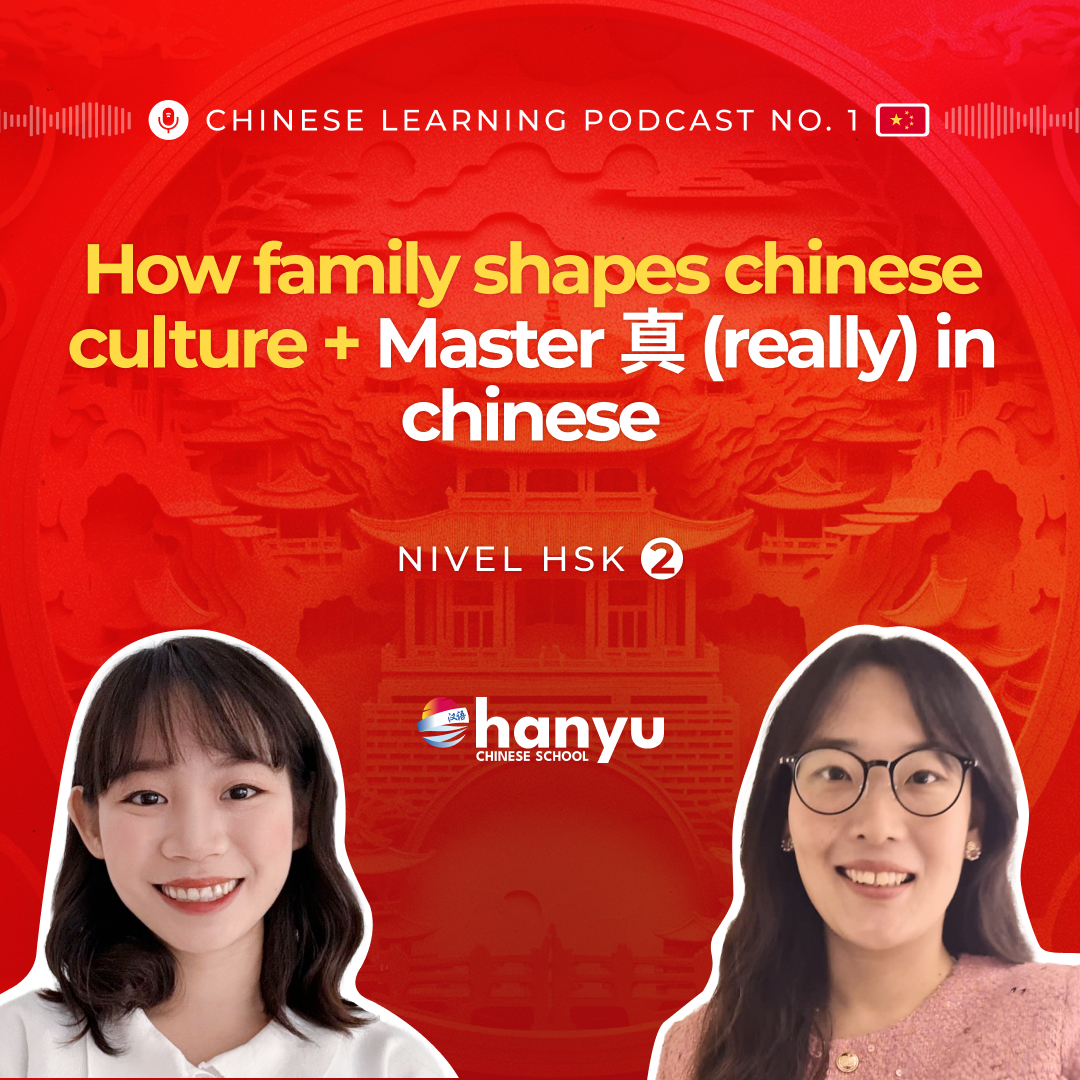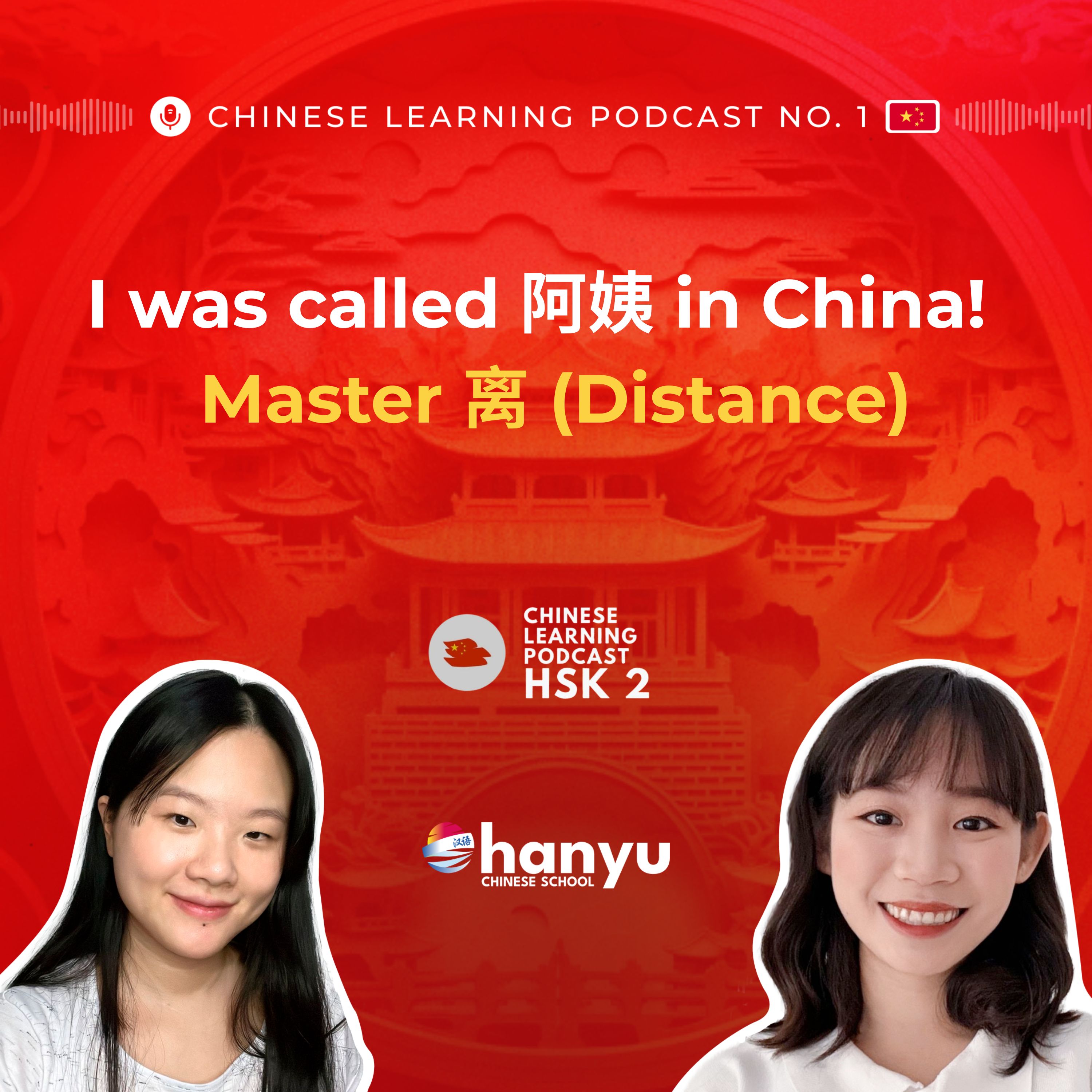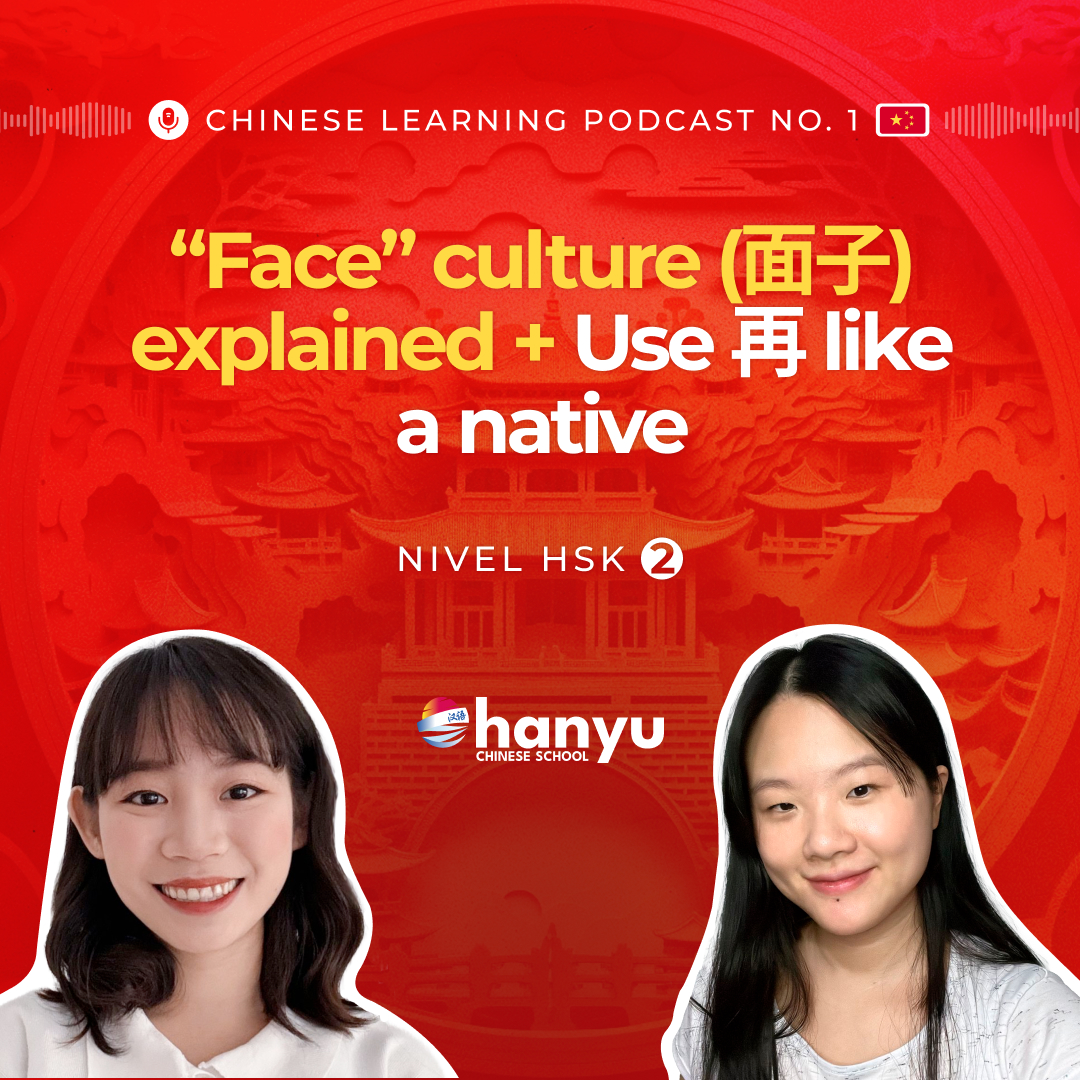Episode Transcript
[00:00:00] Speaker A: Foreign.
Hi, everyone.
HSK2 Booker. Welcome to our 15th HSK2 podcast. I'm Melanie, your old friend, Lao Pengyou. And joining me today is our fabulous old friend, Emily. Hi, Emily.
[00:00:58] Speaker B: Yeah, of course, of course. Me too. Oh, yes.
Okay.
Yeah.
[00:01:10] Speaker A: What we gonna learn today?
[00:01:12] Speaker B: Very good.
So we got an exciting episode ahead of us today.
We are going to focus on a really useful word that is me, which means every.
So we use it as something like that.
[00:01:33] Speaker A: Okay.
So you can use this to talk about your routine in your daily life.
So, yeah, as what you said every day, every week. Mega xing qi or mega zhou.
So we're gonna use this talking about what happens regularly. So mei will make your Mandarin sound natural and fluent. So we'll also dive into a fun cultural segment on something that ties into everyday life in China, so you won't want to miss it.
[00:02:08] Speaker B: Okay, so let's get started.
[00:02:14] Speaker A: Okay, so as you roll, we will start with a dialogue, but before that.
So you are listening to our Hanyu Chinese School podcast. If you're learning Chinese and want to take your skills to the next level, you're going to love this episode. And if you'd like to learn with us, you can try a free one on one class.
Through our platform. We have courses starting from €39 with live classes, recorded lessons, and full access to our online campus.
So you can learn at your own space.
Give me one sec.
Okay, so welcome to Visit our website hanyuchineschool.com and you can choose your path.
[00:03:02] Speaker B: Very good.
So let's start with our dialogue.
The setting is Melanie and I are talking about my daily routine of going to a pet store.
[00:03:19] Speaker A: Okay, so. Pet store.
[00:03:21] Speaker B: Yeah.
[00:03:22] Speaker A: So I will start.
Hi, Emily.
Okay, okay, okay. So let's dive into that's grammar for today, which means every.
We use mei to talk about frequency and regularity. In Chinese, it's often used to express how often something happens. Like every day, every week, or every time.
The first structure.
Yeah, sorry, it's your words.
[00:04:54] Speaker B: Sorry.
So for the first structure, may is followed by a measure word and then a noun. So you can see it up here.
It used to talk.
Talk about every instance of something.
So the first example we have here, like I said in the dialogue, wa make up.
So the major word here we use our magic word and then is the noun. So every weekend.
And then we have the second example.
So remember, we have seen it in the hsk. One is the major word for all kinds of animals. So every cat.
It's my baby.
[00:06:00] Speaker A: Okay, so let's keep Going, we have other examples.
So next let's look at mate every time we which means every time. So it's used to express the idea of each individual occurrence of an action.
So we got an example here.
Here mei CI means every time, focusing on each individual visit to the pet store.
And every time I go to the library, I borrow a few books. In this case, mei CI refers to every individual visit to the library, showing that each time something specific happens. So when you use mei c every time, you're emphasizing each specific occurrence of and action.
[00:07:07] Speaker B: Okay, very good.
So next we have may with all kinds of time period.
So we have like nian, year, month or so week.
So let's take a look. In this case, you wouldn't need the major words. You just use may and then with the. The time period that we have seen. So every year, every month and every week. Okay, let's see some examples.
Every year for the spring festival, the Chinese New Year, the whole family will celebrate together.
So every year.
And then we have the other example.
We go running every week.
So in this case, remember, with the time period, we do not need a measure word.
[00:08:19] Speaker A: Do you have more things to explain now?
[00:08:22] Speaker B: I'm done here. Thank you, Millie.
[00:08:26] Speaker A: Okay, so the key takeaways are first, major word plus noun. Use this structure to talk about every instance of something happening. For example, every weekend. And second, mei c used to talk about every time something happens in a specific instance. For example, every time I, I go to the pet store. Third plus time period used to express every in a specific time period, like every year, every month, and every week.
[00:09:12] Speaker B: So great job. Now you know how the difference for the may and how to use them.
So let's try a little bit of the something.
So here we have a little question for you.
So today, can Melanie help us? Read us out.
[00:09:32] Speaker A: Yeah. So how would you say I go to the gym every day, but I don't go on Sundays in Chinese?
[00:09:42] Speaker B: Yeah. So think about it.
Leave your answer down in the comment section down below and we'll check them out. And so we'll take a look. So very, very excited to see all your answers.
[00:09:56] Speaker A: Okay, have a try.
Okay, now let's move back to our dialogue. And please pay attention to our grammar today, Mei, which means every. Okay, so. Hi, Emily.
Where are you going?
[00:10:21] Speaker B: I'm going to the pet store next to the supermarket.
[00:10:29] Speaker A: You seem to go to the pet store quite often.
[00:10:38] Speaker B: Yes, I go there once every weekend because I need to buy cat food. Look, here's my cat.
[00:11:02] Speaker A: Well, you have so many cats. With so many cats, do you remember each one?
[00:11:15] Speaker B: Of course. Each of the cats is my baby.
[00:11:25] Speaker A: It must take a lot of time to take care of them every day.
[00:11:37] Speaker B: Yes, but every time I take care of them, I'm very happy.
[00:11:43] Speaker A: Did you notice we use quite a few times the May.
[00:11:49] Speaker B: Very good.
So now you have more knowledge, more about knowing how to use May.
So let's take a look.
Okay.
Before we continue, I enjoyed this episode. With our classes, you can make even more progress. We have the top rated online academy with over 3,000 satisfied students. And we have an overall rating on Trustpilot 4.8 out of 5 based on over 2,200 reviews.
So we offer courses starting from €39, including group classes, recordings and.
Well, we have a 24.7learning platform.
So if you like to start step by step, try a free class with us by yourself. You can find everything on our website down below. Hanyuchineschool.com and also you can just scan the QR code right here. You have it right here.
So you can just pause the page, scan the QR code.
Also, if you like to listen to our podcast, if you enjoyed this episode, if you. You are very welcome to. Welcome to our campus. We have all the podcast on all kinds of platform including Spotify, YouTube, Twitch, Apple Podcast.
All the kinds of platform that whatever suits you.
So you can come and take a look if you like our, if you like our podcast, you would probably also like our previous podcasts, right?
So, so very welcome to our website and to come and try our free classes of ours.
[00:13:37] Speaker A: Welcome, Huan Ying.
Okay, now let's move on. So we're gonna talk about some Chinese culture. All right, so let's explore for a fascinating aspect of Chinese culture is using umbrellas for sun protection.
So now if you are from a western country, you might be used to seeing umbrellas only when it rains, but in China and many other Eastern cultures, umbrellas are also used to protect from the harsh sun, especially during the hot summer months.
[00:14:14] Speaker B: Exactly. So especially us girls, we, we really care about this. We really, really do care about this.
We like to use umbrellas to block the sun. But not just any umbrellas. We have like Pacific umbrellas for sun, not just any, any umbrella.
So it's, it's not just a practical tool, it's also, it also deeply ties to the beauty standards here in Asia.
So the reason for that is because fair skin is traditionally considered more beautiful in Chinese culture.
[00:14:56] Speaker A: Exactly, Zheng De Shi. So fair skin has long been associated with beauty and refinement. In China, historically, pale skin was a symbol of someone who didn't have to work outside outdoors. So someone from a wealthier, more privileged class. So having a pale skin, it seem, is seen as a sign of status and elegance. To this day, many Chinese people believe that light skin is one of the most attractive features.
[00:15:32] Speaker B: So I know, like, I. I heard this from my Spanish friend.
She told me that it's actually the opposite in Spain because for them, if you are wealthy enough, you should take more vacations. And when you do take more vacations, you get tent, you go to the beach, you go to the mountain, whatsoever, you get tent. So it's actually different from our three standards.
So have you ever heard about this, Melanie?
[00:16:03] Speaker A: Yes, definitely. So this is totally different cultures from Eastern cultures and Western cultures.
[00:16:11] Speaker B: Yeah, exactly.
So we even have a really famous phrase here in, in Chinese we say, which actually means that one white skin can cover three ugliness of your. Your face. You know, if your eyes is too small, if you have a pimple, if you have something, as long as you're white enough, you look white enough, you're fine.
[00:16:41] Speaker A: Yeah. So that's why maybe Eastern people, Eastern people like so much snow white. Maybe.
Okay. So in a way, it's like the opposite of Western beauty standards, as we have talked about that. So wear a tan soft tinsign as a sign of health and activity. But in China, people often avoid getting a tan at all. Coats because of the beauty ideal that associates pale skin with purity, grace and luxury.
[00:17:17] Speaker B: Yeah. So you can see, like, that's why when you walk around the cities in China on a hot, sunny day, you will see so many people using umbrellas or a big hat to cover the sunlight.
So it's not just about staying cool, but also we would consider this as protecting our skin because too much of the sunlight would damage our skin as well.
So this is also a way for personal care.
[00:17:49] Speaker A: Definitely.
But it's not just about women. Men also use umbrellas to avoid the sun. You might think it's only for women, but in fact, it's quite common for both genders to use umbrellas as a defense mechanism against sun damage. It's all about keeping the skin pale and protected. So it's fair for men and women.
[00:18:15] Speaker B: Yeah, I would say it's both.
Probably you will still see like 60 or 70% of the women using the umbrella, like a little bit more than the guys. But nowadays more and more guys are considered, like, they con. They do consider using the umbrella.
Like my fiance or my friends, they all carry an umbrella with them.
So just for not to get, you know, just not to get.
Right?
Yeah. And also another thing is that like we said, we really, really do care about our whiteness.
So any kinds of beauty product, any kinds of beauty product that is tied up was to help helping your skin get whiter.
It sells in a good price. You know, I'm so guilty to talk about this because I have so many beauty products just to keep my, my skin like lighter.
[00:19:25] Speaker A: Wow. It's incredible how much cultural beliefs shape your ideas, shape our ideas of beauty.
So in eastern cultures like China, beauty is often linked to fair skin, while in the west, tan skin tends to symbolize health and vitality. But in China, the desire for pale skin has deep historical roots, making it a long standing ideal.
[00:19:57] Speaker B: So when you're in China, you'll likely see people walk around with umbrella whether it's sunny or not, as it's still part of their beauty routine.
So it's not just to protect themselves from the sun. Also it's maintaining a cultural idea for the beauty and everything that, you know, it's a beauty standard thing. It's more beauty standard thing. Now.
[00:20:25] Speaker A: It'S fascinating, isn't it? So whether it's the physical protection from the sun or a way to dear to beauty standards, the use of umbrellas in China is packed with cultural significance.
[00:20:41] Speaker B: Yeah. So like we said, it's about maintaining beauty balance and traditional in Chinese culture.
So the next time you see someone using umbrella on a Sunday in China, do not feel strange or do not feel like what is this people doing?
It's just a normal thing for us. Like a really, really normal thing.
Yeah, yeah.
[00:21:06] Speaker A: Please respect the difference. Thank you.
Okay, so earlier we asked, how would you say I go to the gym every day, but I don't go on Sundays in Chinese?
[00:21:19] Speaker B: So the answer is use this for every day. And remember, when you say something you do every day, we use the word for every day, for every, to emphasize the every routine that you do every day.
[00:21:46] Speaker A: Very good. So good job. If you got that one, got that one right. If not, don't worry. Keep practicing and you will master it soon.
Okay, now we'd love to sing to see how you can use may in your own sentences.
So try making a sentence like this, I go to the park every weekend or come up with your own sentence by using may.
[00:22:16] Speaker B: So leave your answers in the comments down below. We will also check them out. We love seeing how you will be using the grammar in a real life sentence.
[00:22:28] Speaker A: Thanks for staying with us until the End. So if you want to truly learn Chinese with real teachers and clear method, welcome to Visit our website hanyuchineschool.com and book your free class. We have courses Starting from just €39 live, live classes, recordings, and a complete platform to help you progress step by step. Plus, all our podcasts are organized in the campus so you can track your progress on our website campus.hanyuchineschool.com podcast and campus.trendland.com podcast.
See you in the class.
[00:23:17] Speaker B: And oh Melanie, I saw some interesting comments that we just got here.
So there is one. One audience is asking if he could ask question. Of course you're really welcome to ask any questions. If you're still listening, please type your questions in the comment section. We can view it now.
Oh, and Melanie, did you see what Dennis wrote? It's a really good.
[00:23:45] Speaker A: Yeah, Dennis wrote.
That's great. Or you can also say to emphasize this every single day.
[00:23:56] Speaker B: That's very good. That's very good.
We are really glad to hear that. It's really good to keep on the good work of learning Chinese.
[00:24:10] Speaker A: Yes, it is.
Okay, so let's review what we have learned for today. So we learned how to use mei to talk about regular actions or frequency. Whether it's every day, every week, or every time or you do something, you now have the tools to express express repetition in Chinese.
[00:24:36] Speaker B: So the next time we will be learning a word which means the most or the best.
So you will learn how to express these kind of things like the tallest, the best, the smartest, these kind of comparing words in the next episode. So you don't want to miss it.
[00:24:59] Speaker A: Definitely not.
Okay, so make sure to subscribe to the podcast. Hit that like button and leave us a comment. If you want to take your learning further, head over to Hanyu Chinese School and book a free trial class with our amazing teachers.
[00:25:17] Speaker B: Yes. So thank you so much for joining us today and thank you for all the comments, all the wonderful comments. We hope that you liked our episode and we hope that you are excited about the next episode as we are.
[00:25:34] Speaker A: Yes. So see you next time.
Sa.


